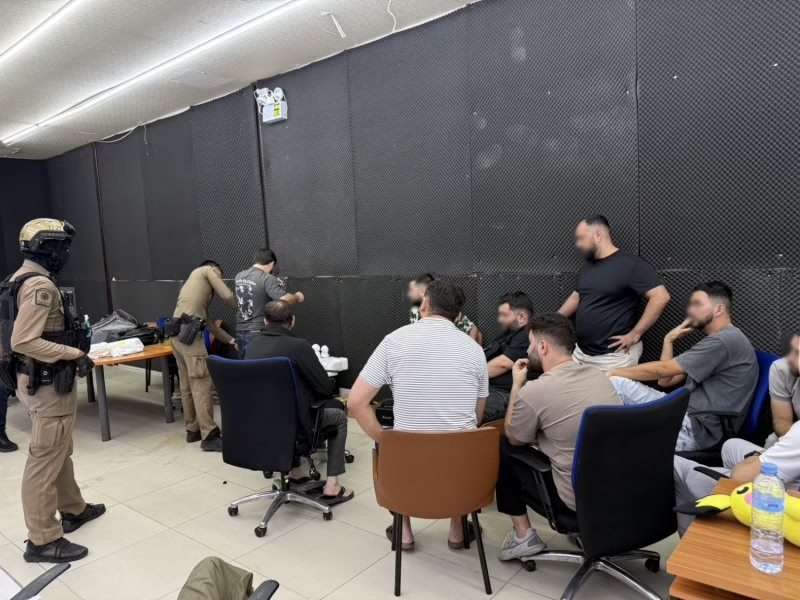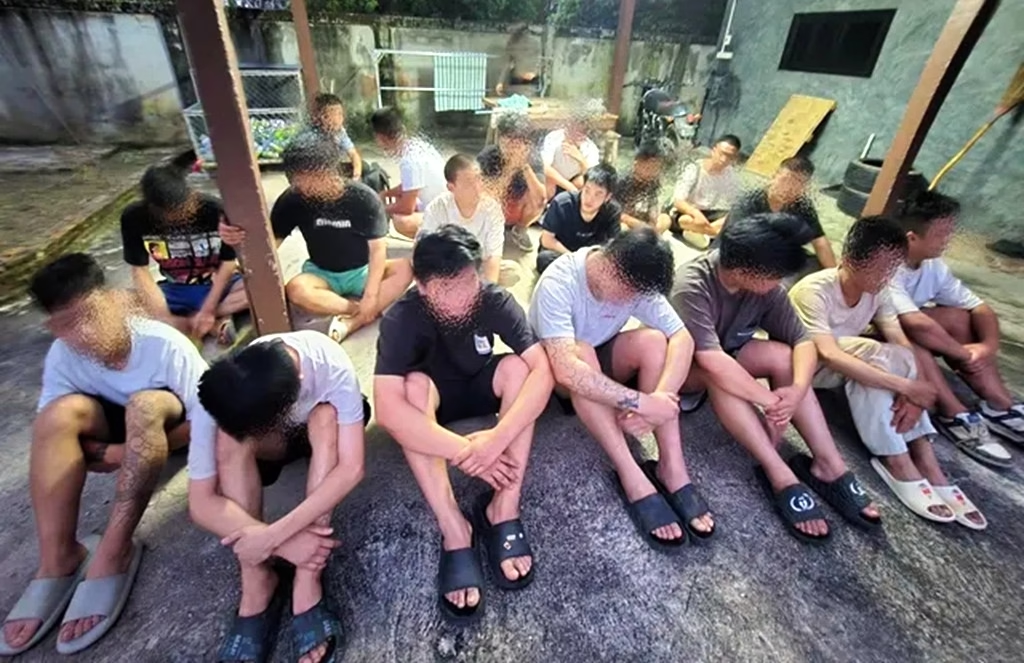BANGKOK – Thailand’s Cyber Crime Suppression Police (Cyber Police) launched a major nationwide crackdown that shook criminal networks across Southeast Asia. More than 300 suspects were arrested in a single month, as police moved to break up groups behind scams, money laundering, and human trafficking.
The operation, called “Saifa Fad: Striking Down Mule Accounts Across Thailand”, ran from 18 to 26 November. It focused on call-centre gangs, fake investment schemes, and online gambling operations that had been targeting victims both inside Thailand and overseas.
Pol Lt Gen Jirabhop Bhuridej, assistant national police chief and deputy director of the CCSC, described the raids as a major strike against cross-border crime groups based in fortified compounds in Myanmar, Laos, and Cambodia.
Over the month, Cyber Police officers searched more than 50 locations, including luxury condominiums in Bangkok and run-down warehouses in cities such as Chiang Mai and Pattaya. Police seized laptops, mobile phones, SIM cards, and cash worth over 10 million baht, and froze bank accounts linked to illicit transfers of more than 500 million baht.
Gen Jirabhop told reporters on 25 November that these criminal networks do more than drain bank accounts. In his words, they damage public trust in Thailand’s online economy. Victims came from every corner of the world, from pensioners in small American towns to young professionals in Shanghai. For Thai authorities, the message was clear: cyber fraud crosses borders with ease, and so must law enforcement.

Foreign Crypto Fraudsters Caught in Bangkok
One of the standout cases involved a multinational group accused of running a sophisticated fake cryptocurrency investment scheme. On 14 November, CCSC officers raided an office building near Soi Nuanchan in Bangkok’s Bang Kapi district during the early morning.
Inside, the Cyber Police detained 15 foreign suspects, made up of nine citizens of Azerbaijan, five from Georgia, and one from Ukraine. Investigators say the group ran a fake investment platform that promised returns of 20 percent per month on supposedly guaranteed digital assets.
The operation posed as a company backed by Silicon Valley investors. Staff followed scripts for cold calls, used deepfake videos, and planted fake testimonials online. Over 2,000 people around the world are believed to have fallen for the scam, losing an estimated 150 million baht.
Pol Col Kissana Phattanacharoen, head of the CCSC financial crimes unit, said officers found servers loaded with phishing tools and cryptocurrency wallets filled with stolen Bitcoin. The platform was operated under the name “CryptoForge Global”. According to police, funds were moved through layers of mule accounts and offshore exchanges to hide their origin, which kept the scheme running for almost a year.
Interpol’s cyber fusion centre in Singapore passed on the original tip that led to the raid. The suspects had entered Thailand on tourist visas and now face charges of fraud, money laundering, and breaches of the 2025 Royal Decree on Technology Crimes. If found guilty, they could receive prison sentences of up to 20 years. Col Kissana stressed that the case is not only about cryptocurrency, but about criminals exploiting people who dream of fast and easy profit.
ATM Raids and the Call-centre Money Network
Further north, CCSC teams hit the financial backbone of a Chinese-run call-centre syndicate that had been draining Thai bank accounts via ATM withdrawals. On 20 November, police arrested seven people in Chiang Mai and Lamphun, including a Laotian coordinator and three Thai account mules.
They were caught in the act at a cluster of ATMs near a busy night market, pulling out 5.2 million baht from compromised accounts.
Investigators linked the money to a recent scam against a minimart owner in Nakhon Sawan, who lost 2.7 million baht after downloading a fake promotional app.
The case opened a window into a larger operation directed from the King’s Roman Casino area in Laos. According to police, Chinese organisers used encrypted messaging apps to give instructions, while account mules in Thailand were paid 7,000 baht for every million baht withdrawn.
Pol Maj Gen Thatchai Pitaneelaboot, commander of the Technology Crime Suppression Division (Cyber Police), said the suspects were part of a structured network, not solo criminals. Officers seized burner phones loaded with call scripts for talking to victims, as well as a handwritten ledger that listed more than 91 million baht in previous withdrawals.
One of the arrested mules, a 32-year-old Thai driver named Aritsara, admitted during questioning that she was tempted by the offer of quick money. She told investigators she did not fully understand that behind every transfer was a real person in distress.
Her account reflects the human cost of these operations, where victims lose life savings while many of the callers are themselves forced workers trafficked from rural China, pushed into 18-hour shifts, and ordered to run romance scams and fake investment pitches.

Fugitive Scammers Caught Near the Myanmar Border
In Chiang Rai, near Thailand’s border with Myanmar, the crackdown produced one of its most symbolic arrests. On 25 November, Tourist Police arrested five Chinese nationals at a small hotel in Rob Wiang subdistrict. The men were trying to escape Myanmar after military raids on scam compounds in areas such as KK Park and Shwe Kokko.
They had crossed the Moei River into Tak province, then travelled north, hoping to slip into Laos and reach the Golden Triangle Special Economic Zone. One suspect, a thin 28-year-old named Zhang Rui, said through a translator that he and his group were fleeing violent raids by the Myanmar junta, which had turned their compound into what he described as a battleground.
The five men were part of a larger flight of more than 1,600 workers and operators leaving Myanmar’s border scam centres. They admitted involvement in so-called hybrid scams that used fake celebrity endorsements and deepfake videos to target Americans.
Thai officers were tipped off by members of the Karen Border Guard Force, who reported that a group was heading north for a planned transfer to Lao handlers. Police seized fake identity documents, 20 SIM cards, and a laptop that contained IP logs pointing to victims in the United States.
The case highlighted how porous border areas help keep these networks alive. Myanmar’s military, under strong pressure from China, demolished more than 600 buildings in KK Park in the previous month, but many scammers simply scattered and tried to regroup on Thai soil.
Pol Lt Gen Kritthapon Yisakhon, Chiang Rai Provincial Police chief, said the province would not be treated as a safe zone for scammers. His officers remain on alert along the Mekong and mountain routes used by cross-border gangs.
Phones, Passbooks, and the Machinery of Mule Accounts
Raids across Thailand also exposed the logistics chain that keeps these criminal operations running. Officers discovered parcels and stash houses filled with mobile phones, bank passbooks, and ATM cards, all prepared for shipment to Chinese organisers in Laos and Cambodia.
On 11 November, police searched a villa in Mae Rim, near Chiang Mai, and found 174 mobile phones, 277 bank passbooks from major Thai banks, and 73 ATM cards. These items are used to open and control mule accounts through remote facial recognition systems. Gen Jirabhop described them as tools of financial warfare rather than simple gadgets.
The equipment, valued at about 20 million baht, was meant for operators who would activate and use the accounts from outside Thailand. They would shift stolen funds through these accounts before abandoning them and starting again with new details.
Another major seizure took place in Chiang Saen on 23 October, when officers intercepted a courier carrying 2,057 ATM cards and bundles of passbooks. The items had been shipped by private delivery services and were on their way to contacts in Laos.
Col Kissana described the network as an assembly line built for fraud. Many of the people handling the accounts were recruited with fake job ads, then forced or pressured into illegal work.
During the November operation, police intercepted 49 such parcels across the country. They also froze 181,989 fraudulent bank accounts and blocked access to 19,676 online gambling websites.
A Year of Heavy Losses to Cybercrime
The scale of cybercrime in Thailand in 2025 has been severe. From January to November, authorities recorded around 887,000 cybercrime complaints, with total reported losses passing 89 billion baht. That figure marked a rise of about 45 percent compared with 2024, according to CCSC data.
Investment scams accounted for roughly 28 billion baht in losses. Call-centre frauds and similar schemes cost victims another 60 billion baht, often with the money routed through cryptocurrency mixers and chains of mule accounts.
Deputy Prime Minister Prasert Jantararuangtong said daily losses at the start of the year averaged about 65 million baht, which was lower than the 117 million baht per day recorded the previous year. Even so, the human toll remained harsh, with destroyed retirement plans, reported suicides among victims, and a drop of around 20 percent in foreign investor confidence, based on assessments by the Bank of Thailand.
The 2025 Technology Crimes Decree has become a key legal tool. It requires banks to freeze suspicious accounts within hours instead of days, and introduces shared responsibility for online platforms that allow scams to flourish. Officials say that in the first half of 2025 alone, these measures blocked an extra 5.8 billion baht from being stolen.

FBI and Cyber Police Work in Tandem
Thailand’s fight against cybercrime has drawn support from international partners, especially the United States Federal Bureau of Investigation (FBI). On 15 November, Thai and American officers held a joint briefing in Washington to outline “Operation Mekong Shield”, a coordinated campaign against scam operations in Sihanoukville in Cambodia, the Golden Triangle in Laos, and Myawaddy in Myanmar.
FBI Deputy Director Jeanine Pirro said that the crime compounds in these areas not only run fraud, but they also operate on a scale that harms American victims by tens of billions of baht each year. A US Strike Force recently sanctioned 15 Cambodian entities connected to such activities.
Under the cooperation agreement, Thai cyber police units share blockchain tracking data with the FBI’s Virtual Asset Unit. This has helped return assets to victims in about 500 cases since March.
At the same time, joint mechanisms with China and Myanmar have led to the extradition of around 5,500 suspects, including alleged scam kingpin She Zhijiang, who was sent from Bangkok to Beijing on 13 November.
Regional meetings under the Lancang-Mekong framework in Hanoi have backed the use of artificial intelligence for information sharing on cross-border crime. Observers from the United Nations Office on Drugs and Crime (UNODC) are also monitoring developments along the shared borders.
Thai Prime Minister Anutin Charnvirakul has supported sharper controls along communication routes, including targeted signal blackouts in some border areas, which officials say have cut scam calls by about 67 percent.
Challenges remain. As Myanmar’s military presses its raids, many scammers are shifting operations into Thailand. Security experts warn that crime groups may fight back with online attacks such as DDoS strikes or deeper infiltration of local systems.
Gen Jirabhop has stressed that the campaign against cybercrime will be long and demanding. For now, the November operation has taken more than 300 suspected criminals off the streets, protected billions of baht, and raised public awareness of online safety.
In the glow of Bangkok’s night skyline, Thailand’s push for safer digital spaces continues, with the understanding that the battle against scams and online fraud is far from finished.

















